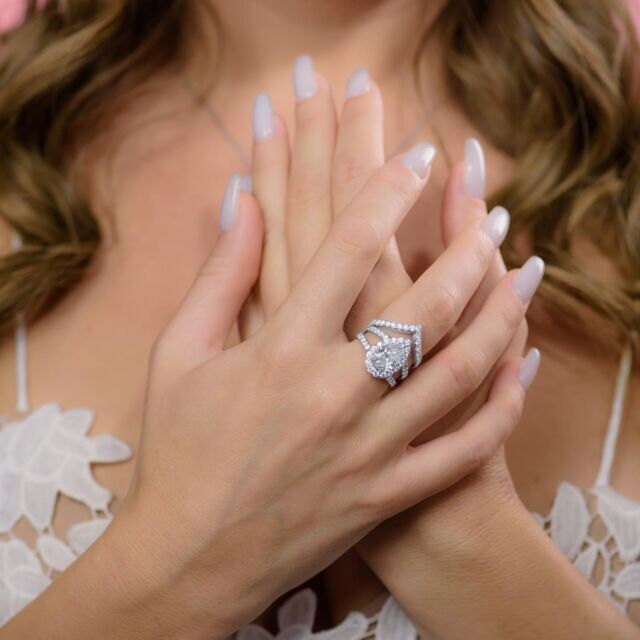An engagement ring should be a reflection of the person wearing it. A woman that has a simpler, more traditional style might prefer a beautifully made solitaire setting with one sparkly center diamond. Women who love flashier styles might be attracted to a pave setting with lots of brilliant diamonds. While a vintage setting with detailed engraving might be the perfect pick for a sentimental woman that loves the classics.
Fashionistas may be in love with beautiful baguette side stones that incorporate colored gemstones. Tension settings will likely appeal to a woman with a more modern style. Think about your significant other's personality and the right ring style will become clear. Remember, you will be adding a wedding band that will need to match the engagement ring's style and metal. For someone that has small hands, a thinner band is a better choice. If the person has slightly larger hands, a thicker band may be a more appropriate choice.
Prongs Setting
A prong set engagement ring is the most traditional setting style. Prongs show very little metal on the diamond and maximize light exposure.
The absence of metal allows for more light to pass through the diamond, thus maximizing its brilliance.
Bezel Setting
Bezel settings are known for their clean lines and durability. The bezel surrounds the outer edge of the diamond, framing it with a thin layer of gold or platinum. Although a bezel setting is one of the most secure options you can choose, this style setting does affect the brilliance of the center stone as no light passes through from the sides. Choosing white gold or platinum can give the diamond a larger appearance. Bezel settings can accommodate any shape or size diamond.
Tension Setting
A tension setting is a unique and modern diamond setting style. Tensions set rings feature a center diamond that is held in place by pressure. When viewed from the side of the ring, the diamond will appear to be floating. Tension settings may not look very secure, but they are. The metal used to make these rings go through a special hardening process before it is used. The hardened metal grips the diamond with a vice-like grip making it a very secure setting method.
Channel Setting
Channel set engagement rings are known for their brilliance and durability. In a channel setting, diamonds are set into the ring channel, or groove. Because these diamonds are embedded into the ring channel, there are no prongs to snag and minimal risk of diamonds falling out. If you work with your hands or need to wear gloves for your job, a channel setting would make a great choice.
Twist setting
Twist settings are an increasingly popular trend for engagement rings. Twist set engagement rings have thin metal woven or braided down the ring. Some have more of an open twist and some are thinner and more tightly woven. You can opt for a minimalist, high polished metal ring, or if you like something a little more sparkly, small diamonds can be pave set down the band.
Bar Setting
Bar settings are a modern twist on the channel setting. Bar set diamonds have two metal bars that hold the diamond in place giving it a more square appearance. Because there are only two bars holding the diamond, the sides are open allowing more light to reach your diamond and increase its brilliance. You can bar set or channel set smaller diamonds down the band if you would like to add some additional sparkle.


